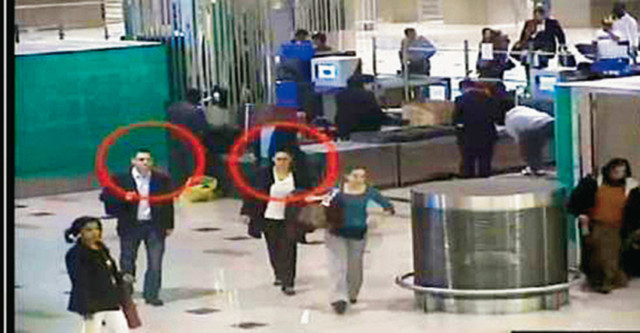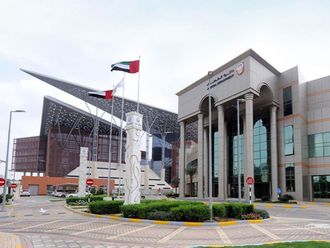
Dubai: High-level criminals may run, but Dubai Police pledge they can’t hide forever.
Indeed, the hunt is still very much on for crimials who have made the upper echelons of the Dubai Police Most Wanted list.
While the jury is out as to whether some of the top criminals will ever be brought to justice for murders and violent armed robberies, special investigators in Dubai continue to burn the midnight oil revisiting every clue in the never-ending quest to mete out justice, say senior police officials.
Without a doubt, topping the list of the most-wanted criminals are those identified by police as part of the death-squad that carried out the execution of Hamas leader Mahmoud Al Mabhouh on January 19, 2010.
Such high-profile crimes do not happen often in the stable emirate of Dubai, giving the case of the cold-blooded killing of the Palestinian leader real urgency.
There are 20 people wanted by police in connection with the killing at a premiere Dubai hotel including four Irish suspects.
Dubai Police have other cases which they continue to flesh out in the hope of bringing most-wanted suspects before the courts.
Violent crimes
Take the case of Atif Qamruddin Popere, 22, who is wanted for allegedly murdering his wife in March and then fleeing to his native India.
There are suspects wanted for violent crimesi such as Mitic Bonjana, a 32-year-old female from Serbia who is sought for a brazen armed robbery, and Lincic Borko, 33, from Serbia, also wanted for armed robbery.
The Wanted Persons Department is working hard to combat criminal threats while anticipating challenges.
It targets fugitives wanted locally and internationally.
In the past three years 24,000 persons wanted locally have been arrested and 526 international suspects have been arrested here.
As many as 106 fugitives have been extradited to countries where they are wanted and 84 fugitives wanted by Dubai were retrieved from other countries through international extradition treaties.
Brigadier Khalil Ebrahim Al Mansouri, director of the Criminal Investigation Department (CID), said the wanted persons department includes three sections — local, the Interpol section and the diplomat section.
“The department is set to hunt up wanted persons, both at the local level and internationally and was established as a small Interpol section in the early 1980s,” he said.
Prosecution
Brigadier Al Mansouri told Gulf News that the Wanted Persons Department is part of the Department of Criminal Investigation and it was set up as a department in 2004 to exchange information and databases about most criminals all over the world.
“This department played an important role in the past few years by developing mutual assistance and international cooperation in the widest sense among all police forces in the world which will help to control crime and the prosecution of criminals locally and internationally, due to the changes in the kinds of crime and the easy movement of criminals between countries,” he said.
In 2011, the Wanted Persons Department established a new section called the diplomatic and consular affairs section in order to follow up and coordinate with diplomatic authorities in the country in terms of cases related to wanted criminals in their respective countries.
“The Wanted Persons Department is getting great attention from Dubai’s Police Chief, Lt General Dahi Khalfan Tamim, as well as his deputy, Major General Khamis Mattar Al Mazeina because of its importance for the security in the country and worldwide,” he said.
“Organised criminals have no barriers or national borders and law enforcement has to be as flexible through cooperation at the regional and global levels – to not only facilitate the exchange of expertise and intelligence about suspects but to carry out joint operations whenever possible,” said Brigadier Al Mansouri.
Explaining how the system of international police cooperation works, Brigadier Al Mansouri, said: “Dubai Interpol is acting through the Abu Dhabi Central National Office — the communication unit, which is responsible for following up international notices issued by the Interpol General Secretariat.” He said there are several international notices issued by Interpol beginning with the red notice for an international arrest warrant.
The blue notice is used to request information about the identity of persons and to determine the places of residence of offenders.
International Bulletin Green is used to warn member states of offenders.
Missing persons
A yellow notice is a search for missing persons, including minor children and women, who are mainly victims of human trafficking, while a black notice is used to identify dead people, he added.
Colonel Salem Khalifa Ali Al Rumaithi, deputy director of the investigations for search and follow-up department at the CID, said that the UAE has become the focus of attention all over the world as the UAE enjoys booming trade and economy.
Larger numbers of businessmen and traders are working here and that is making police more alert to keep Dubai secure.
A close eye on business dealings has helped reclaim Dh5 billion in lost funds from suspects and that was done with help of the new electronic programme A.B.C. based on the classification of wanted persons on charges of felonies and misdemeanours.
With this investigative programme as a tool, investigators have instant access to databases containing information on locally and internationally wanted persons and suspects, and records on a broad range of crimes.
“This system is a statewide computerised file of fugitives for whom arrest warrants have been issued,” said Colonel Al Rumaithi.
“Interpol has contributed to arresting a large number of most wanted persons who had committed serious crimes, and is still making all efforts to arrest others. We have good ties with Interpol as well as the judicial systems in both the UK and the US. However, the extradition depends on various matters as well as bilateral agreements.”
Extradition
Colonel Al Rumaithi said that the UAE continues to work closely with all countries to bring criminals to justice.
On the entry of people wanted by other countries, he said those who had given the police a slip would be apprehended and brought to book.
“They are then referred to the Public Prosecution which takes action according to the seriousness of their crime,” he said.
In such cases, the Public Prosecution asks for extradition documents which are to be received within a specified period.












